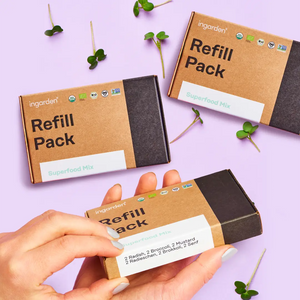Organic broccoli (included in the monthly price)
Energy + Focus · 6 Pads
Couldn't load pickup availability
 Free shipping on orders over €39
Free shipping on orders over €39
 6 pads = 1 month's supply of organic microgreens
6 pads = 1 month's supply of organic microgreens
 Germination guarantee: If your pads fail to germinate, we will replace them free of charge.
Germination guarantee: If your pads fail to germinate, we will replace them free of charge.
INGARDEN 101
INGARDEN 101
We believe that health begins with good nutrition.
Each of our varieties adds over 27 essential vitamins and minerals to your food – for your immune system + regeneration, energy +
Focus on hair and skin.
Ingarden will deliver the best growing experience, guaranteed. Test each variety, and if it doesn't germinate as expected, even though we promise it will, simply send us an email to info.de@ingarden.com and we'll send you a new pack free of charge.
PRODUCT DESCRIPTION
PRODUCT DESCRIPTION
Contains plenty of ...
- Folic acid : for the immune system, energy and cell division
- Vitamin C : for the immune system, stress, and iron absorption
- Vitamin K1 : for blood clotting, bone and tooth formation
- Magnesium : for reducing fatigue, electrolyte balance, energy, muscles and bones
- Manganese : for stress, energy, bones and connective tissue
- Sulforaphane¹ : for detoxifying the body
Grows within 7 days | 24 micronutrients & minerals | Vegan | Gluten-free | Non-GMO | No fertilizers, pesticides or other harmful additives | 6 pads
TASTE
TASTE
Sweet and mild to spicy and piquant with a firm bite.
NUTRIENTS
NUTRIENTS
Compared to supermarket broccoli, ingarden's organic broccoli contains microgreens:
- 424% more biotin
- 169% more manganese
- 150% more magnesium
- 12% more calcium
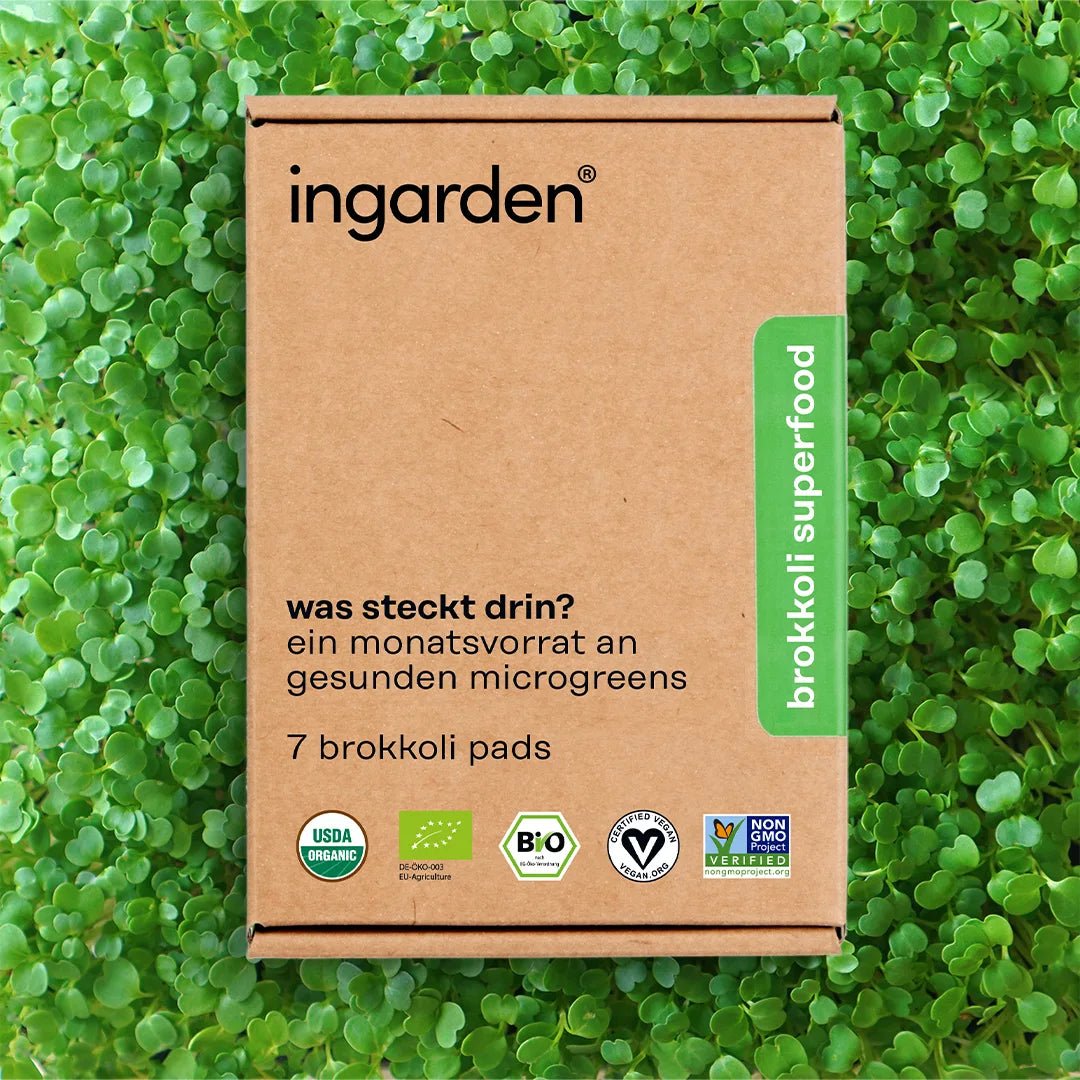
Our organic broccoli is bursting with benefits and can:
strengthen the immune system
boost metabolism
promote bone formation
Increase energy
Promote healthy skin and hair
promote blood clotting
Nutrient power clinically tested
With ingarden, you demonstrably supplement your dishes with valuable nutrients and health-promoting ingredients.
| Empfohlene Tagesdosis | broccoli | |
|---|---|---|
| Vitamin B1 (Thiamine) | 1mg | 0.05mg (5%) |
| Vitamin B2 (R5P) | 1.1mg | 0.07mg (6%) |
| Vitamin B3 (Niacin) | 12mg | 0.7mg (7%) |
| Vitamin B6 | 1.2mg | 0.13mg (10%) |
| Vitamin B8 (Biotin) | 30μg | 2.62μg (9%) |
| Vitamin C | 95mg | 24.1 mg (25%) |
| Vitamin E | 12mg | 0.25mg (2%) |
| Vitamin K1 | 60μg | 36.5μg (61%) |
| Folic acid | 300μg | 33.1μg (11%) |
| Choline | 400mg | 31.3 mg (8%) |
| calcium | 700mg | 65mg (9%) |
| iron | 10mg | 0.73mg (7%) |
| magnesium | 300mg | 45mg (15%) |
| manganese | 2mg | 0.7mg (35%) |
| Lutein | 6mg | 1.98mg (33%) |
| potassium | 4,000mg | 250mg (6%) |
| zinc | 7mg | 0.4mg (6%) |
| phosphorus | 700mg | 73mg (10%) |
| copper | 1mg | 0.05mg (5%) |
| Beta-carotene | - | 953μg |
Key findings
Compared to 100g of raw supermarket broccoli*, 100g of organic broccoli microgreens from ingarden contain:
- 424% more biotin
- 169% more manganese
- 150% more magnesium
- 12% more calcium
- 4% more lutein
* Source
* Source
The nutritional values of our microgreens may vary as they are a natural product.
| Empfohlene Tagesdosis | arugula | |
|---|---|---|
| Vitamin B1 (Thiamine) | 1mg | 0.06mg (6%) |
| Vitamin B2 (R5P) | 1.1mg | 0.09mg (9%) |
| Vitamin B3 (Niacin) | 12mg | 0.03mg (3%) |
| Vitamin B6 | 1.2mg | 0.14mg (12%) |
| Vitamin B8 (Biotin) | 30μg | 5.15μg (17%) |
| Vitamin C | 95mg | 11mg (12%) |
| Vitamin E | 12mg | 0.33mg (3%) |
| Vitamin K1 | 60μg | 17.2μg (29%) |
| Folic acid | 300μg | 57.4μg (19%) |
| Choline | 400mg | 17.3 mg (4%) |
| calcium | 700mg | 42mg (6%) |
| iron | 10mg | 2.2mg (22%) |
| magnesium | 300mg | 33mg (11%) |
| manganese | 2mg | 0.74mg (37%) |
| Lutein | 6mg | 4.42 mg (74%) |
| potassium | 4,000mg | 360mg (9%) |
| zinc | 7mg | 0.8mg (11%) |
| phosphorus | 700mg | 53mg (8%) |
| copper | 1mg | 0.07mg (7%) |
Key findings
Compared to 100g of raw supermarket arugula*, 100g of organic arugula microgreens from ingarden contain:
- 57% more iron
- 56% more manganese
- 51% more folic acid
- 24% more lutein
- 13% more choline
* Source
* Source
The nutritional values of our microgreens may vary as they are a natural product.
| Empfohlene Tagesdosis | Kale | |
|---|---|---|
| Vitamin B1 (Thiamine) | 1mg | 0.05mg (5%) |
| Vitamin B2 (R5P) | 1.1mg | 0.04mg (4%) |
| Vitamin B3 (Niacin) | 12mg | 0.5mg (5%) |
| Vitamin B6 | 1.2mg | 0.1mg (9%) |
| Vitamin B8 (Biotin) | 30μg | 1.89μg (6%) |
| Vitamin C | 95mg | 15.3 mg (16%) |
| Vitamin E | 12mg | 0.08mg (1%) |
| Vitamin K1 | 60μg | 9.11μg (15%) |
| Folic acid | 300μg | 33.8μg (11%) |
| Choline | 400mg | 18.5 mg (5%) |
| calcium | 700mg | 36mg (5%) |
| iron | 10mg | 0.51mg (5%) |
| magnesium | 300mg | 23mg (8%) |
| manganese | 2mg | 0.6mg (30%) |
| Lutein | 6mg | 1.94mg (32%) |
| potassium | 4,000mg | 250mg (6%) |
| zinc | 7mg | 0.5mg (7%) |
| phosphorus | 700mg | 39mg (6%) |
| copper | 1mg | 0.04mg (4%) |
| Beta-carotene | - | 953μg |
Key findings
Compared to 100g of raw supermarket kale*, 100g of organic kale microgreens from ingarden contain:
- 2213% more choline
- 89% more biotin
- 9% more manganese
* Source
* Source
The nutritional values of our microgreens may vary as they are a natural product.
| Empfohlene Tagesdosis | Mustard | |
|---|---|---|
| Vitamin B1 (Thiamine) | 1mg | 0.04mg (4%) |
| Vitamin B2 (R5P) | 1.1mg | 0.07mg (6%) |
| Vitamin B3 (Niacin) | 12mg | 0.1mg (1%) |
| Vitamin B6 | 1.2mg | 0.1mg (9%) |
| Vitamin B8 (Biotin) | 30μg | 7.24μg (24%) |
| Vitamin C | 95mg | 9.36 mg (10%) |
| Vitamin E | 12mg | 0.204mg (2%) |
| Vitamin K1 | 60μg | 11.2μg (19%) |
| Folic acid | 300μg | 33.1μg (11%) |
| Choline | 400mg | 60.8 mg (15%) |
| calcium | 700mg | 38mg (5%) |
| iron | 10mg | 0.95mg (10%) |
| magnesium | 300mg | 31mg (10%) |
| manganese | 2mg | 0.44mg (22%) |
| Lutein | 6mg | 0.89mg (15%) |
| potassium | 4,000mg | 240mg (6%) |
| zinc | 7mg | 0.81mg (12%) |
| phosphorus | 700mg | 58mg (8%) |
| copper | 1mg | 0.08mg (8%) |
| Beta-carotene | - | 1570μg |
Key findings
Compared to 100g of processed yellow mustard*, 100g of organic mustard microgreens from ingarden contain:
- 30-20% more Vitamin C
- 708% more lutein
- 700% more vitamin K1
- 373% more folic acid
- 171% more choline
- 45% more biotin
* Source
The nutritional values of our microgreens may vary as they are a natural product.
| Empfohlene Tagesdosis | radish | |
|---|---|---|
| Vitamin B1 (Thiamine) | 1mg | 0.08mg (9%) |
| Vitamin B2 (R5P) | 1.1mg | 0.06mg (6%) |
| Vitamin B3 (Niacin) | 12mg | 0.5mg (4%) |
| Vitamin B6 | 1.2mg | 0.16mg (13%) |
| Vitamin B8 (Biotin) | 30μg | 2.88μg (10%) |
| Vitamin C | 95mg | 14.6 mg (15%) |
| Vitamin E | 12mg | 0.58mg (5%) |
| Vitamin K1 | 60μg | 61.4μg (102%) |
| Folic acid | 300μg | 39.6μg (13%) |
| Choline | 400mg | 20.9 mg (5%) |
| calcium | 700mg | 32mg (5%) |
| iron | 10mg | 0.48mg (5%) |
| magnesium | 300mg | 33mg (11%) |
| manganese | 2mg | 0.47mg (24%) |
| Lutein | 6mg | 3mg (50%) |
| potassium | 4,000mg | 220mg (6%) |
| zinc | 7mg | 0.4mg (6%) |
| phosphorus | 700mg | 51mg (7%) |
| copper | 1mg | 0.04mg (4%) |
| Beta-carotene | - | 2110μg |
Key findings
Compared to 100g of raw supermarket radish*, 100g of organic radish microgreens from ingarden contain:
- 29900% more lutein
- 5700% more vitamin E
- 4623% more Vitamin K1
- 581% more manganese
- 476% more biotin
- 313% more magnesium
- 222% more choline
- 65% more folic acid
- 20% more iron
* Source
* Source
The nutritional values of our microgreens may vary as they are a natural product.
| Empfohlene Tagesdosis | red cabbage | |
|---|---|---|
| Vitamin B1 (Thiamine) | 1mg | 0.09mg (9%) |
| Vitamin B2 (R5P) | 1.1mg | 0.08mg (7%) |
| Vitamin B3 (Niacin) | 12mg | 0.9mg (8%) |
| Vitamin B6 | 1.2mg | 0.17mg (14%) |
| Vitamin B8 (Biotin) | 30μg | 4.79μg (16%) |
| Vitamin C | 95mg | 21.7mg (23%) |
| Vitamin E | 12mg | 1.32mg (11%) |
| Vitamin K1 | 60μg | 15.9μg (27%) |
| Folic acid | 300μg | 55.8μg (19%) |
| Choline | 400mg | 53.1 mg (13%) |
| calcium | 700mg | 120mg (17%) |
| iron | 10mg | 0.76mg (8%) |
| magnesium | 300mg | 38mg (13%) |
| manganese | 2mg | 0.37mg (19%) |
| Lutein | 6mg | 0.99mg (17%) |
| potassium | 4,000mg | 220mg (6%) |
| zinc | 7mg | 0.7mg (10%) |
| phosphorus | 700mg | 67mg (10%) |
| copper | 1mg | 0.06mg (6%) |
| Beta-carotene | - | 2460μg |
Key findings
Compared to 100g of raw supermarket red cabbage*, 100g of organic red cabbage microgreens from ingarden contain:
- 270% more manganese
- 243% more calcium
- 211% more choline
- 200% more lutein
- 140% more biotin
- 138% more magnesium
- 59% more folic acid
- 52% more iron
* Source
* Source
The nutritional values of our microgreens may vary as they are a natural product.
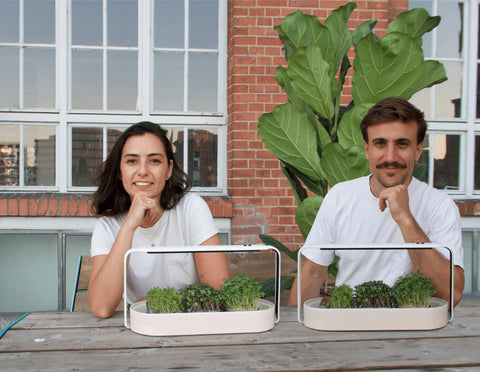
Vitamins for eating, not for taking orally.
When we discovered the power of natural nutrients, we swapped pills for sprouts. And then... microgreens! 40 times more nutrients and flavor. The science was undeniable. We had found the natural alternative. No grow kit met our needs, so we built our own. Now it's a global team and a life-changing food source.
Mariana & Christian
Founder of ingarden
Frequently Asked Questions
arugula
High in lutein (4.42mg/100g), a natural antioxidant that is believed to play an important role in protecting eye health 👁️
broccoli
High in vitamin C (24.1mg/100g), which supports the immune system and normal cognitive function 🧠
Kale
Rich in manganese (1.98mg/100g), which prevents stress and increases energy 💪
Mustard
Rich in vitamin B8 (biotin) (7.24 μg /100g), which supports healthy hair and skin 💅
radish
Rich in vitamin K1 (61.4μg/100g), which supports the growth of bones and teeth and activates the proteins for blood clotting 🩸
red cabbage
Rich in calcium (120mg/100g), which supports healthy bones and teeth 🦷🦴
Our seeds come from the Emilia-Romagna region of Italy and the Netherlands. Ingarden seeds are sourced exclusively from trusted and certified organic growers. This means that our seeds are certified organic by accredited authorities who verify that no artificial fertilizers, herbicides, or pesticides are used. Each seed batch is tested by laboratories for microbiological safety according to HACCP standards, a guaranteed germination rate of 90%, as well as for appearance and integrity. The seeds are processed only by certified organic producers who avoid cross-contamination and adhere to the highest hygiene standards.
Our microgreens reach their highest nutrient density after 7 to 14 days of growth. Therefore, we recommend harvesting them completely within this period. After approximately 14 days, the young vegetables leave the microgreen stage. From then on, the desired quality and nutrient density can no longer be guaranteed.
It's important that you always clean your indoor garden with clean hands to avoid potential contamination. Airborne particles can also lead to mold growth.
No, ingarden microgreens do not attract insects. However, make sure you change the water and clean the ingarden after each harvest.
Seed germination is a complex process influenced by various factors such as light, water, and temperature. Always ensure your seed pads are moist and that there is enough water in the tray. Clean the wicks of any old roots before the next use. If germination is uneven, we recommend using germination trays for the first 2-3 days to facilitate the process. Learn more about our germination trays in our shop. For further questions, please contact our customer service at info.de@ingarden.com .
Our certified organic seed pads are made from biodegradable cellulose, therefore the pads are completely biodegradable and compostable.
Different types of microgreens have varying heights and growth rates due to variations in their genetics and growth patterns. A microgreen's height can also depend on factors such as the amount of light, temperature, and humidity it receives. Some microgreen varieties, like mustard and radish, tend to grow taller than others, such as broccoli and red cabbage, which are typically shorter. The growth rate of microgreens can also influence their height, as some varieties grow faster or slower than others.
If you are having problems with germination or growth, we have several resources for you:
- Check out our instruction page, which contains helpful tips.
- Send us an email to info.de@ingarden.com and, if possible, attach a photo so that our customer service can look at your case.
- Take advantage of our germination guarantee if your seed pads don't germinate.
Meet ingarden. Your stylish fully automatic garden coffee machine.
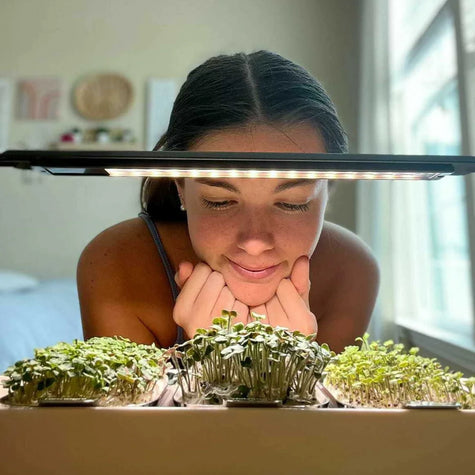

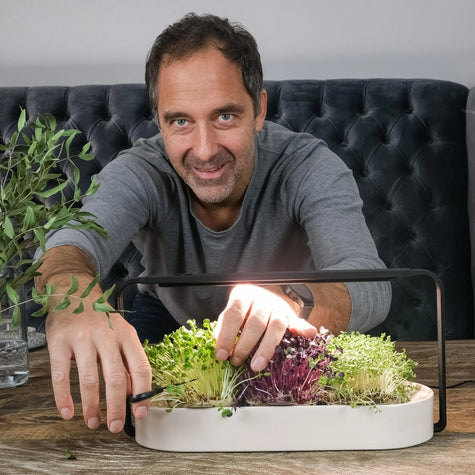




 6 pads = 1 month's supply of organic microgreens
6 pads = 1 month's supply of organic microgreens Germination guarantee: If your pads fail to germinate, we will replace them free of charge.
Germination guarantee: If your pads fail to germinate, we will replace them free of charge.



